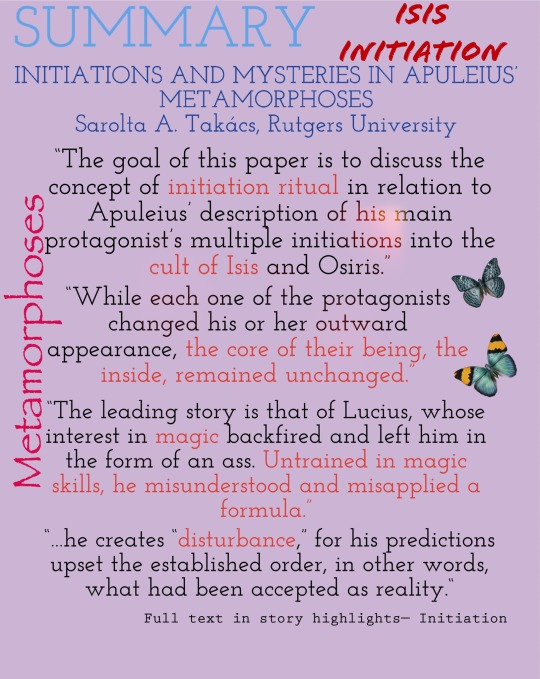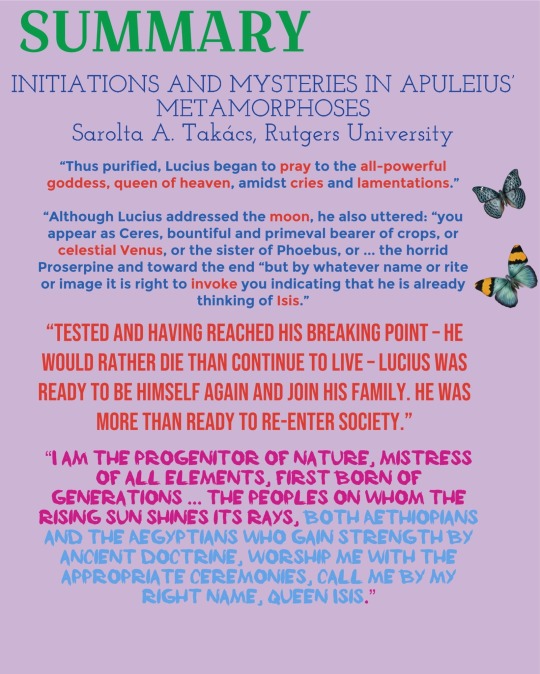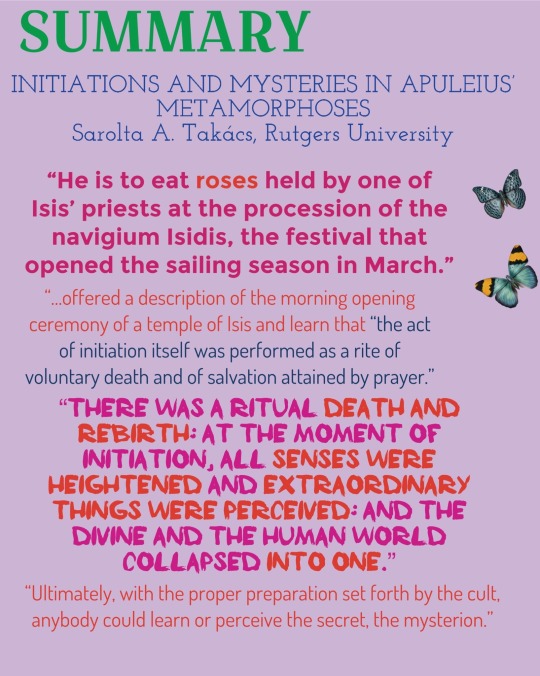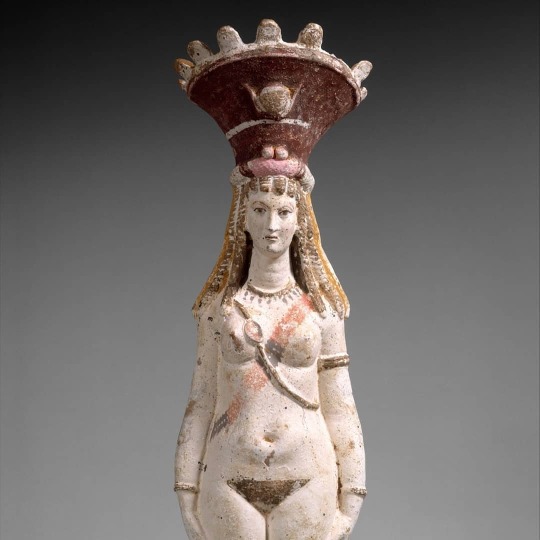#thegoldenass
Text






Isis initiation
Summary
0 notes
Text
When Curiosity Killed the Cat: Apuleius’ “The Golden Ass”
Note on the text: I used E. J. Kenny’s translation of Apuleius’ The Golden Ass as published in 2004 by Penguin Books.
This is the funniest book that I have read in a long time. To have to “reduce” the book down to something semi-serious is a crime, because I can’t adequately convey just how funny this book actually is. One of the genuinely interesting themes in this book though is the theme of curiosity.
The man character is a man named Lucius, and his tragic flaw is his curiosity. Although he certainly does not see it that way. As he himself says: “[It’s] not that I’m nosy, it’s just that I’m the sort of person who likes to know everything, or at least as much as I can” (8). It is his insatiable curiosity that gets him into trouble. It is his impertinent curiosity about magic that gets him into the trouble that really kicks the story into a higher gear. At one point he sees his hostess turn herself into an owl and this enthralls him so much that he asks his lover, who is one of the servants,to let him into the room where the mistress keeps all of her magic potions: “Will you do as I earnestly ask and show me where she is actually practicing her supernatural arts? . . . . For I have a passionate to see magic done with my own eyes” (49). It is at this point that he begins to reap a “bitter reward for [his] ill-starred curiosity” because he accidentally mixes up the bottles and instead of becoming a majestic bird, turns into a donkey.
Later in the book, Lucius hears the story of Cupid and Psyche. Psyche is a human girl who, like Lucius, is too curious for her own good. She is married to Cupid, the god of love. Cupid has one condition for their marriage, that she cannot look at him. In ancient days, it was believed that any person who looked at a god while the god was in his god form would die. So Cupid makes a deal with her where he promises to be the best husband he can, and to give her everything she wants, but in return she has to promise to not even try to look at him. In order to make it easier for her, he only comes to her at night and gives her free reign to do whatever she wants during the day. Initially Psyche agrees to this, but her jealous sisters, who know that Cupid is a god, convince her that her husband cannot be who he says he is and that she should look at him while he sleeps in case he is deceiving her. That night,
as curious as ever, Psyche could not restrain herself from examining, and handling, and admiring her husband’s weapons. She took one of the arrows out of the quiver and tried the point by pricking her thumb. . . . Thus without realizing it Psyche through her own act fell in love with love. Then ever more on fire with desire for Desire, she hung over him, gazing in distraction and devoured him with quick sensuous kisses, fearing all the time that he might wake up (88).
Eventually, however, Cupid does wake up and upon “seeing his confidence betrayed and sullied, flew off from the loving embrace of his unhappy wife without uttering a word” (89). Psyche had a god for a husband and now, because she let her curiosity get the best of her, now has nothing.
After Cupid leaves Psyche, the goddess Venus, his mother, tells Psyche that the only way she can see Cupid again is by completing a series of tasks, the last of which requires Psyche to go to the Underworld to get Venus a box that contains some of Persephone’s beauty. However before she reaches the Underworld, she is warned not to look into Persephone’s box. However right before she completes her mission, Psyche
madly succumbed to her reckless curiosity. ‘What a fool I am’, said she, ‘to be carrying divine beauty and not help myself [to even] a tiny bit of it’. . . . So saying, she opened [up] the box. But she found nothing whatever in it, no beauty, but an infernal sleep, a [truly Stygian sleep] which when the lid was taken off and it was let out at once took possession of her and diffused itself in a black cloud of oblivion throughout her whole body, so that overcome by it, she collapsed on the spot where she stood in the pathway, and lay motionless, a mere sleeping corpse (104).
It is only through Cupid’s intervention at the end of the story that Jove, the king of the gods, decides to have pity on Psyche and make her a god so she can continue to be Cupid’s wife. It is only because Jove chose to have mercy on her that she got her “happy ending”. Had she been left to her own devices it never would have happened.
Similarly, Lucius only gets his happy ending through the intervention of Isis who decides to have pity on him. She transforms him back into a human and accepts him as a member of her cult. But even at the end of the story, after everything he has been through and heard, he still has a “curiosity problem”.
Initially, Isis and her priests attempt to help him by, in effect, taking away the temptation. Lucius notes that during his initiation the priest is reading from a book that was written in “unknown characters. Some of these [characters] represented animals and were shorthand for formulaic expressions, and some were written in the form of knots or rounded like a wheel or twisted off at the ends like vine-tendrils to guard their meaning against the curiosity of the initiated. From these he read to me what I needed to procure my initiation” (208). In other words, he knows that the priest is trying to protect him from his own curious nature by only telling him what he needs to know and nothing else. He is hoping that Lucius will, in effect, lose interest. But what we see at the end of the story is that that is not the case. Lucius just as curious at the end of the story as he was at the beginning, and more than that he shows that despite everything that has happened the reader is just as curious as he is. He accuses the reader of having the same“self-destructively” curious personality that he does:
I dare say, attentive reader, that you are all agog to know what was said and done. I should tell you if it were lawful to tell it; you should learn it if it were lawful to hear it. But then your ears and my tongue would both incur equal guilt, the one for sacrilegious loquacity and the other for inopportune curiosity. But since it may that your anxious yearning is piously motivated, I will not torment you by prolonging your anguish (209).
So at the end of the day, despite all of the warnings regarding inopportune curiosity, he still just as recklessly curious and willing to spread the gossip as he was before, and, perhaps more importantly, so are we.
This was a hilarious book. One of the great things about this book, and about most comedies, is how it was able to say something semi-serious in a non-nonchalant way. Comedies are, in many ways, better equipped to send serious messages than dramas are because it is easier to digest. As Mary Poppins once said, “A spoon full of sugar helps the medicine go down in the most delightful way”. What a great, extremely funny, and insightful book.
3 notes
·
View notes
Video
#Repost @liberveritatis ・・・ Asinus aureus #metamorphoses #apuleius #thegoldenass #lucius #madaurus, #numidia #curiositas #magic #transformation #salvation #Isis #cult #darksurrealism #surrealism #classicism #surrealismo #videotableau #videoassemblage #videoarte # #skeleton #hourglass #mementomori #floatingeye (at Perkolator)
#isis#repost#darksurrealism#skeleton#classicism#metamorphoses#curiositas#lucius#cult#videotableau#apuleius#transformation#hourglass#salvation#videoarte#numidia#madaurus#thegoldenass#mementomori#floatingeye#surrealism#magic#videoassemblage#surrealismo
1 note
·
View note
Text
A Review of The Tale of Psyche and Cupid by Apuleius
A Review of The Tale of Psyche and Cupid by Apuleius
Perhaps my favorite piece of art in the Louvre Museum in Paris is the statue entitled Psyche being revived by Cupid’s kiss by the the neoclassical sculpture Antonio Canova. I’ve been aware of the myth of Psyche and Cupid since my mythology unit in elementary school and I looked into it when researching fairytales a few years ago. The definitive version of the story comes from a larger work…
View On WordPress
#antoniocanova#aphrodite#apuleuis#beautyandthebeast#cupid#grecoroman#mythology#psyche#psycheandcupid#sleepingbeauty#thegoldenass#thelouvre#writing#books#Disney#essays#reviews
0 notes
Photo

Читая роман Апулея "Метаморфозы, или Золотой осел", живое и занимательное свидетельство жизни в эпоху Поздней Античности, я заинтересовался образом богини Исиды, спасающей героя в конце романа из его отчаянного положения. – Вследствие чего благодарный богине исцеленный герой становится ее целомудренным жрецом и проходит ряд посвящений в таинства Исиды и Осириса. Вот как презентует себя богиня в 11-й главе романа: «Вот я пред тобою, Луций, твоими тронутая мольбами, мать природы, госпожа всех стихий, изначальное порождение времен, высшее из божеств, владычица душ усопших, первая среди небожителей, единый образ всех богов и богинь, мановению которой подвластны небес лазурный свод, моря целительные дуновенья, преисподней плачевное безмолвие. Единую владычицу, чтит меня под многообразными видами, различными обрядами, под разными именами вся вселенная» Здесь публикую фото террактовой раскрашенной статуэтки Исиды-Афродиты из Музея Метрополитен в Нью-Йорке, около 150 г. н.э., 49,5 см. высотой, происходящей из эллинизированного Египта. / Reading Apuleius’s novel The Metamorphoses , or the The Golden Ass, a lively and entertaining evidence of life in the era of Late Antiquity, I became interested in the image of the goddess Isis saving the hero at the end of the novel from his desperate situation. - As a result of which, the healed hero becomes her chaste priest and passes a series of initiations into the sacraments of Isis and Osiris. Here I publish a photo of a terracotta painted statuette of Isis-Aphrodite from the Metropolitan Museum of Art in New York, circa 150 AD, 49.5 cm tall, originating from Hellenized Egypt. #древняяГреция #Исида #daand_photo #ИскусствоДревнегоРима #ПоздняяАнтичность #Апулей #Золотойосел #КультИсиды #АнтичнаяРелигия #ГреческаяМифология #ИскусствоДревнейГреции #историяДревнейГреции #ГреческаяЛитература #ДревнийРим #МихаилКузмин #ancientGreece #Isis #ДревнеРимскаярелигия #ИсторияИскусства #LateAntiquity #Apuleius #TheGoldenAss #IsisCult #RomanReligion #GreekMythology #AncientGreekArt #AncientGreekHistory #GreekLiterature #AncientRome #AncientRomeArt (at Rome, Italy) https://www.instagram.com/p/CCKgCqTIIC-/?igshid=vc0k42jre2sz
#древняягреция#исида#daand_photo#искусстводревнегорима#поздняяантичность#апулей#золотойосел#культисиды#античнаярелигия#греческаямифология#искусстводревнейгреции#историядревнейгреции#греческаялитература#древнийрим#михаилкузмин#ancientgreece#isis#древнеримскаярелигия#историяискусства#lateantiquity#apuleius#thegoldenass#isiscult#romanreligion#greekmythology#ancientgreekart#ancientgreekhistory#greekliterature#ancientrome#ancientromeart
0 notes